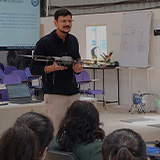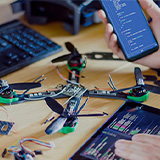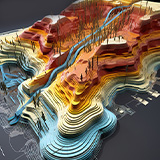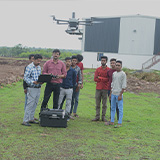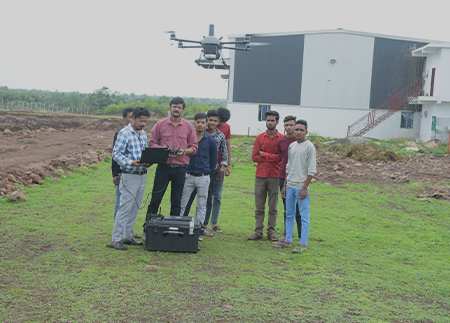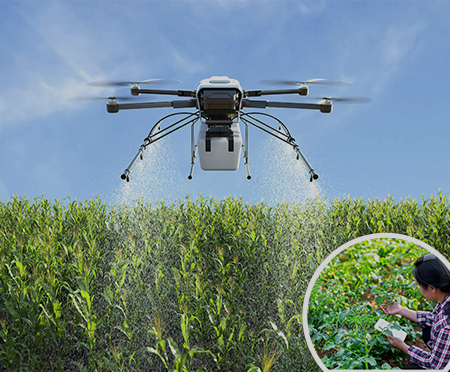UAV Data Collection Course in India: Master Drone Skills
The UAV Data Collection Course in India is tailored to provide in-depth knowledge and practical skills in drone data acquisition and processing.
Designed for professionals and enthusiasts alike, this comprehensive course focuses on advanced UAV sensors, data collection protocols, and image processing techniques to meet the growing demand in sectors such as:
- Agriculture
- Land Surveying
- Construction
- Environmental Monitoring
With hands-on training in drone mapping software and data analysis, the program ensures participants are industry-ready and equipped to handle diverse applications of drone technology.
Sensors & Payload Selection for Data Collection
Understanding the components of a drone is a critical first step in mastering UAV technology. This module delves deep into the:
- One of the foundational aspects of drone data acquisition is understanding sensors and payload types.
- This module offers detailed insights into the functionality and applications of advanced sensors such as multispectral, thermal, and LiDAR.
- These sensors play a crucial role in industries ranging from precision agriculture, where multispectral sensors help assess crop health, to environmental monitoring, where thermal sensors detect heat signatures and track wildlife.
You will also explore the capabilities of LiDAR sensors for creating accurate terrain models, which are critical in infrastructure development and geological mapping.
The module emphasizes selecting the right sensor for specific tasks and optimizing payloads to enhance flight efficiency and data quality.
By mastering these skills, participants gain the confidence to deploy UAVs in complex, real-world scenarios.
Drone Data Processing Syllabus PDF: 3D Modeling and Beyond
- The Drone Data Processing Syllabus PDF offers an in-depth guide to mastering the transformation of raw drone data into actionable insights.
- This resource covers essential topics such as image stitching, 3D modeling, and advanced mapping techniques using industry-standard software like Pix4D and Agisoft Metashape.
- It also details the best practices for processing high-resolution images and videos, ensuring data accuracy for applications in construction, agriculture, and land surveys.
- With this PDF, learners can revisit key concepts and techniques, making it an invaluable tool for refining their skills and excelling in drone data analysis projects.
Proficiency in Drone Mapping Software
Mastering drone mapping tools like Pix4D and Agisoft Meta Shape is a cornerstone of this course. These powerful software platforms are essential for converting drone-acquired data into professional-grade maps, 3D models, and topographical data.
Participants will learn to input raw drone data, apply advanced processing techniques, and generate precise outputs tailored to industry needs.
This module also covers georeferencing, output customization, and troubleshooting to ensure accuracy and reliability in mapping tasks.
By the end of the training, participants will have the skills to manage end-to-end mapping projects, whether creating digital elevation models for land surveying or producing orthomosaics for urban planning.
This hands-on experience prepares learners to excel in roles requiring advanced mapping and analysis capabilities.
Looking to Start UAV Data Acquisition & Processing Course?
- The structured curriculum ensures that learners build both technical expertise and practical skills applicable to real-world scenarios.
- With a focus on sensors, mapping software, and data analysis, the course prepares participants for roles in high-demand industries that rely on drones for efficiency and precision.
- By completing this program, learners gain access to cutting-edge tools and techniques that empower them to handle complex UAV projects confidently.
- For those seeking a well-rounded education in drone data acquisition and processing, this course offers an unmatched opportunity to excel in this rapidly growing field.
At the conclusion of the course, you can download the Drone Curriculum PDF, which consolidates all modules into an accessible format for ongoing reference and professional development.
Dr. Arvind Kumar has over 15 years of experience in UAV technology and geospatial sciences. He specializes in integrating AI-driven automation in drone operations. As a DGCA-certified drone pilot, Dr. Kumar is passionate about sharing his knowledge with aspiring drone professionals, helping them excel in this transformative field.
Dr. Arvind Kumar
With over four years of diverse experience spanning technical and managerial domains, Chetna Sharma has consistently demonstrated leadership, innovation, and adept project management skills in alignment with DGCA guidelines. Her journey has been marked by a passion for driving technological advancements, particularly in the realm of unmanned aerial vehicles (UAVs) and drone manufacturing.
Chetna Sharma
Drone Data Processing Careers in India for Innovative Minds
Drone technology has become a cornerstone of modern industries, enabling precise data collection and advanced analytics. Drone Data Processing Careers in India are gaining prominence as industries like agriculture, infrastructure, and environmental conservation increasingly adopt UAVs (Unmanned Aerial Vehicles) for decision-making.
Professionals trained in drone data acquisition and processing have access to a wide array of opportunities, from creating high-resolution maps to analyzing environmental changes.
By mastering advanced tools such as UAV photogrammetry, LiDAR, and GIS software, individuals can transform raw aerial data into actionable insights.
This expertise is in high demand across sectors that rely on geospatial intelligence and efficient data processing, making it a lucrative and promising career pathway.
Top UAV Mapping Job Opportunities in India for Professionals
- The growing need for geospatial data has created abundant UAV Mapping Job Opportunities in India, making it one of the most exciting fields for drone professionals.
- Upon successful completion, you can work in sectors such as precision agriculture, land surveying, infrastructure monitoring, environmental conservation, and disaster management by leveraging advanced drone data collection and processing techniques.
- Professionals in UAV mapping play a critical role in creating 2D and 3D maps, analyzing topographical data for urban planning, and conducting surveys for land-use management.
- These skills are indispensable in industries that require accuracy and efficiency in mapping and analysis, such as construction and renewable energy.
- With tools like Pix4D and Agisoft Metashape, UAV mapping specialists contribute to innovative solutions for large-scale projects.
As drone adoption continues to rise in India, skilled professionals in UAV mapping are increasingly in demand. Whether it’s assessing infrastructure conditions or monitoring agricultural yields, these roles offer exciting opportunities to make a tangible impact on industry operations.
Thriving Environmental Monitoring Jobs in India
India’s commitment to sustainable development and environmental preservation has significantly expanded the scope for Environmental Monitoring Jobs in India.
With drones becoming essential tools for monitoring ecosystems, analyzing land use, and assessing climate patterns, professionals trained in UAV data processing are instrumental in addressing environmental challenges.
These roles often involve the use of advanced sensors, such as thermal cameras and multispectral imaging tools, to provide insights into vegetation health, water quality, and wildlife habitats.
In disaster management, drones assist in real-time data collection for quicker response and recovery efforts.
By completing a course in drone data acquisition and processing, you not only gain expertise in advanced UAV technologies but also position yourself to contribute to India’s environmental sustainability goals.



